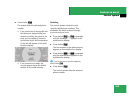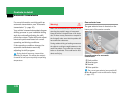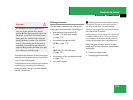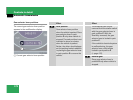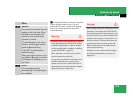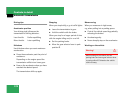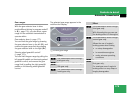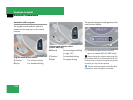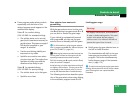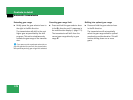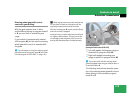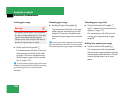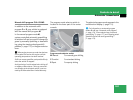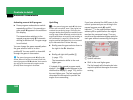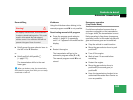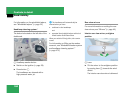
177
Controls in detail
Automatic transmission
̈ Press program mode selector switch
repeatedly until the letter of the
desired program mode appears in the
multifunction display.
Select C for comfort driving
(CLK 63 AMG: for standard driving):
ț The vehicle starts out in second
gear (both forward and reverse) for
gentler starts. This does not apply if
full throttle is applied or gear
range 1 is selected.
ț Traction and driving stability are
improved on icy roads.
ț Upshifts occur earlier even when
you give more gas. The engine then
operates at lower rpms and the
wheels are less likely to spin.
Select S for standard driving
(CLK 63 AMG: for sporty driving):
ț The vehicle starts out in first gear.
ț Upshifts occur later.
Gear selector lever one-touch
gearshifting
With the gear selector lever in drive posi-
tion D and driving in program mode C or S,
you can limit or extend the gear range.
If your vehicle is equipped with manual
shift program M, you can use the gear
selector lever to manually shift the gears.
The following instructions describe opera-
tion of the gear selector lever when driving
in the automatic program mode C or S.
Limiting gear range
̈ Briefly press the gear selector lever to
the left in the D- direction.
The transmission will shift to the next
lower gear as permitted by the shift
program. This action simultaneously
limits the gear range of the transmis-
sion (
୴ page 175).
i
For information on using the gear selector
lever in program mode M, see “Manual shift pro-
gram CLK 63 AMG” (
୴ page 181).
!
Allow engine to warm up under low load use.
Do not place full load on the engine until the
operating temperature has been reached.
Shift into reverse gear R or park position P only
when the vehicle is stopped.
Avoid spinning of a drive wheel when driving off
on slippery road surfaces. This may cause seri-
ous damage to the drivetrain which is not cov-
ered by the Mercedes-Benz Limited Warranty.
Warning! G
On slippery road surfaces, never downshift
in order to obtain braking action. This could
result in drive wheel slip and reduced
vehicle control. Your vehicle’s ABS will not
prevent this type of loss of control.
i
To avoid overrevving the engine when down-
shifting, the transmission will not shift to a lower
gear if the engine’s max. speed would be
exceeded.



